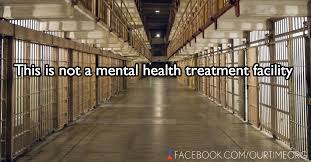
Unfortunately, the caption on this photograph is incorrect. Georgia jail accredited as a treatment facility.
(3-4-19) We have hit the tipping point.
The Chatham County Detention Center in Savannah, Georgia has become the first jail in the United States to be accredited for mental health services by the National Commission on Correctional Health Care.
I’m grateful that Sheriff John Wilcher has made mental health a priority since he was elected. The Detention Center now has a full-time psychiatrist, more counselors, upgraded mental health first aid training, and an improved screening process for those coming into the jail.
But I am also horrified with this announcement.
Providing mental health services in a jail will certainly be more humane, but it is another sign of our failure to help people by providing treatment services in state hospitals and in community settings. By drastically reducing treatment beds, refusing to adequately fund community mental health services, and stubbornly refusing to intervene until someone becomes dangerous, we have reached a point where we are officially linking treatment to incarceration.
This is wrong.
Can you imagine telling cancer patients that they must be in jail to get help?
Sheriff Wilcher is quoted by WTOG television as saying:
“They’re supposed to build us a building somewhere out on the Southside where we can take these type of people who are really not troublemakers,” he said. “They’re just off their medication, and they get into these tizzies. I’m not a jail for [those with] mental health [problems], but by law, I have to take those people, and they have to be treated if they’re in jail.”
None of us should be surprised by this logical consequence.
Re-read that first line again: “They’re supposed to build us a building somewhere out on the Southside where we can take these type of people who are really not troublemakers,”
How is this different from the old state hospital system that we decided in the 1960s was inhumane and needed to be ended in favor of community care? Oh wait, there is one difference. Now those housed in these new buildings will have a criminal record added to their burden.
Where’s the outrage?
The services that we need to help the seriously mentally ill are not available so law enforcement – and our loved ones – get stuck. Caught in a Catch-22 – as so eloquently described by Sheriff Wilcher. Persons with serious mental illnesses don’t need to be in jail but they end up there and by law, he has to care for them.
We should not be surprised. For nearly two decades, it has been well-known that jails and prisons were becoming our new asylums. For more than a decade, we have known that 367,000 individuals with serious mental illnesses were being locked up in jails and prisons, more than 2.2 million were being booked into jails each year and more than 1 million were on probation.
Until we accept that some individuals need longer term hospitalization to become stable, until we find a way to safeguard civil rights without waiting for someone to become dangerous, until we demand that insurance cover mental health care like physical illnesses, and until we begin adequately funding community treatment – such as Housing First and Assertive Community Treatment teams – this will be our grim reality.
I, for one, am deeply frustrated and saddened. This is not progress. It is capitulating.



